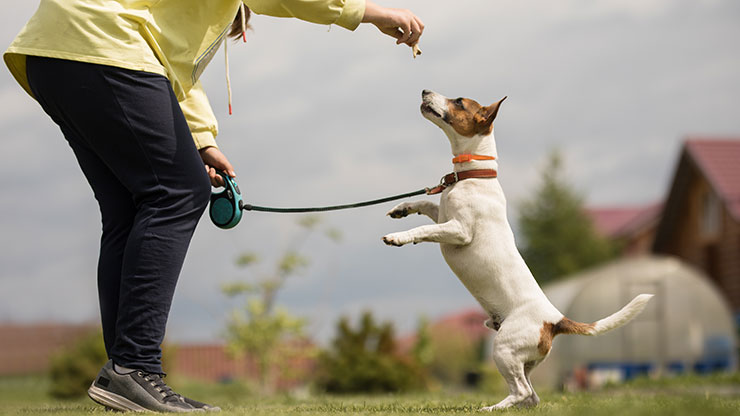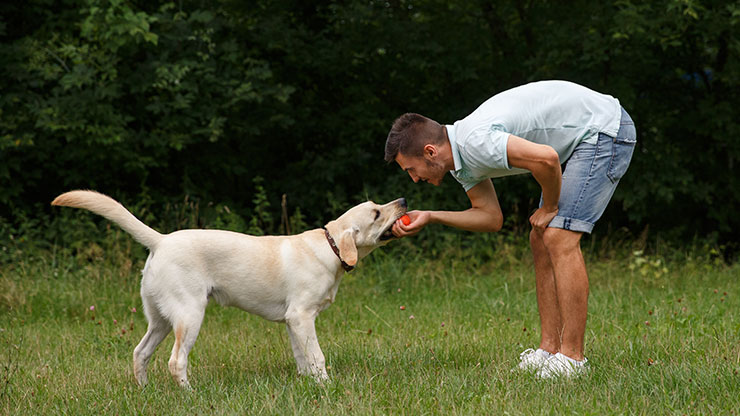
Choosing the Perfect Guide: Unleashing the Best Dog Trainer for Your Furry Friend
"Whoever said you can't buy happiness forgot little puppies." – Gene Hill
Welcoming a dog into your family brings immense joy and companionship. However, it also comes with its fair share of challenges. From obedience training to addressing behavioral issues, finding the right dog trainer is crucial in nurturing a strong and healthy bond with your beloved pet. In the book "How to Find Your Ideal Dog Trainer" by Susan M. Wilson, a renowned expert in the field, you'll discover a comprehensive guide to navigating the complex realm of dog training and behaviorists, ensuring you find the perfect match for your furry companion.
The Significance of Effective Dog Training
Your four-legged friend is not just a pet but a living, thinking, and feeling being. They deserve the best care and training. Effective training requires time, effort, and commitment from you and your trainer. "How to Find Your Ideal Dog Trainer" emphasizes the importance of making an educated decision and guides you in finding a trainer who understands your dog's unique needs and your own training goals and values.
Proper training is essential for your dog's well-being and overall behavior. It helps them develop good manners, ensures their safety, and strengthens the bond between you and your furry companion. A well-trained dog is likelier to be happy, confident, and obedient, making them a joy to be around.
Understanding the Roles of Trainers and Behaviorists
Trainers, often erroneously referred to as pet therapists or behavior counselors, specialize in obedience training and basic behavior modification. They play a vital role in teaching you and your dog the necessary skills to prevent unwanted behaviors and foster appropriate conduct. A knowledgeable and ethical trainer will conduct a functional assessment to understand the root causes of your dog's behavior and design a tailored plan for improvement.
Behaviorists, on the other hand, are professionals who specialize in addressing more complex behavioral issues. They understand animal behavior and psychology more deeply and employ evidence-based techniques to modify behavior. If your dog exhibits severe aggression, anxiety, or other behavioral challenges, your veterinarian may consult a behaviorist for a thorough assessment and specialized treatment plan.
Both trainers and behaviorists can contribute significantly to your dog's well-being and training journey. It's important to recognize their different areas of expertise and seek the appropriate professional assistance based on your dog's specific needs.
Choosing the Right Professional Help
Finding the right professional help is essential to enhancing your relationship with your dog and creating a happy, harmonious home. "How to Find Your Ideal Dog Trainer" is a guide offering practical advice on identifying your ideal trainer and establishing effective communication between you, your veterinarian, and your chosen professional. By taking this journey, you're investing in your dog's well-being and ensuring they won't become one of the millions of dogs ending up in shelters yearly.

Setting Training Goals
Understanding your goals as a dog owner is essential for finding the perfect trainer. "How to Find Your Ideal Dog Trainer" thoughtfully walks readers through the process of self-reflection, helping them identify their training objectives and align them with the trainer's expertise. Whether you desire obedience training, agility training, or even therapy dog training, this chapter provides the necessary tools to set the stage for success.
To define your training goals, consider what behaviors you want your dog to learn or improve. Do you want them to respond reliably to basic commands like sit, stay, and come? Are you interested in teaching them advanced tricks or participating in dog sports? Or do you need assistance addressing specific behavioral issues like leash pulling, separation anxiety, or fear aggression?
Once you have a clear vision of your training goals, you can better communicate them to potential trainers and find someone who specializes in the areas you wish to focus on. Setting realistic expectations and being open to collaboration with your trainer will contribute to a positive and successful training experience for you and your furry friend.
The Consultation Process
The search for an ideal dog trainer can be overwhelming, but fear not! With "How to Find Your Ideal Dog Trainer" as your guide, you'll learn how to navigate the consultation process. This initial interaction with a trainer is crucial in determining whether they fit you and your dog.
Start by gathering a list of potential trainers based on recommendations and research. Reach out to them to schedule a consultation or a phone call. During this conversation, share your training goals, discuss your dog's specific needs and behavior, and ask any questions you may have. This is an opportunity to gauge their expertise, professionalism, and compatibility with your training philosophy.
Ask about their training methods and philosophies. Are they knowledgeable in positive reinforcement techniques, which focus on rewarding desired behaviors rather than punishing undesirable ones? Avoid trainers who rely heavily on aversive techniques or use equipment like shock collars, prong collars, or choke chains, as these methods can cause fear, anxiety, and physical harm to your dog.
Observation and Evaluation
To ensure a successful partnership, getting to know your prospective trainer before committing to their services is crucial. The book advises starting with a phone call to discuss your concerns, ask important questions, and gauge their compatibility with your training goals. Wilson covers every aspect that should be considered during the consultation process, from emergency procedures to certifications and training methods to behavior modification specialties.
Observation plays a vital role in evaluating a trainer's methods and skills. You can assess how the trainer works with other dogs and their owners by attending classes or sessions without your dog. A good trainer understands that training humans are just as important as training dogs, and their positive and encouraging approach fosters an enjoyable learning environment. The book provides essential tips on what to look for during these observations, emphasizing the importance of positive reinforcement and ruling out any forms of punishment.
Choosing the Right Training Setting
Choosing the ideal training setting is essential for your dog's comfort and success. Whether you opt for private in-home coaching, private coaching at a facility, group coaching, or board and train programs, "How to Find Your Ideal Dog Trainer" guides you through the considerations for each option. It emphasizes the importance of a seamless transition between training environments and transferring learned behaviors to your home.
Consider your dog's personality, needs, and specific behavior challenges when choosing the training setting. Some dogs may thrive in a group environment, while others may require the focused attention of private coaching. The book guides how to assess the pros and cons of each option and make an informed decision based on your dog's individual needs and your personal preferences.

The Importance of Socialization
Early socialization training is pivotal in raising a well-adjusted and friendly pet. Susan M. Wilson delves into the impact of socialization on a dog's behavior, illustrating how a lack of early exposure can lead to reactivity or fearfulness. She outlines the socialization process, emphasizing the importance of exposing puppies to new environments and continuing socialization classes throughout their growth. The book offers guidance for owners with unsocialized dogs on seeking certified trainers or behaviorist specialists to facilitate practical training and address any resulting anxieties.
Addressing Trauma and Behavioral Challenges
Just like humans, dogs can carry the emotional weight of past traumas. Susan M. Wilson sensitively explores the effects of PTSD-like symptoms in dogs arising from abuse, neglect, or other traumatic experiences. While full recovery may not always be possible, she emphasizes the significance of patience, care, and understanding in helping these dogs heal. By recognizing the signs of trauma and providing a nurturing environment, owners can support their furry companions on the journey to a happier and more secure life.
Building a Lifelong Bond through Ongoing Training and Enrichment
When you find your ideal trainer, relief, hope, and confidence fill the air. You know that their training approach aligns with your dog's needs and provides ongoing communication, education, and guidance. The book emphasizes the trainer's role in teaching you how to understand your dog's communication, prevent unwanted behaviors, reinforce positive habits, and provide mental and physical stimulation.
Conclusion
Your search for the perfect dog trainer ends with "How to Find Your Ideal Dog Trainer" by Susan M. Wilson. This comprehensive guide empowers dog owners to make informed decisions and forge a strong partnership with a trainer who understands their unique needs. Remember, the journey to a well-trained and happy dog starts with finding the right guide. Embrace the opportunity to unlock your dog's true potential and create a lifetime of cherished memories together.
With "How to Find Your Ideal Dog Trainer," you can embark on a training journey to strengthen your bond with your beloved four-legged companion. Understanding your dog's unique needs, observing and selecting the right trainer, and employing positive reinforcement techniques can set the stage for successful training and a harmonious partnership. The book covers various aspects of training, including communication, socialization, specialized training, and ethical considerations, providing a holistic approach to dog training and behavior. With expert insights, troubleshooting tips, and practical strategies, this book will guide you toward a rewarding relationship with your furry friend.










